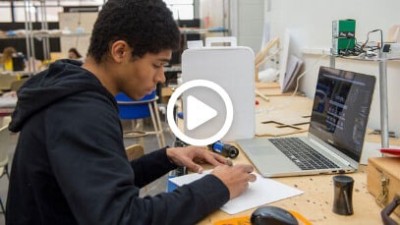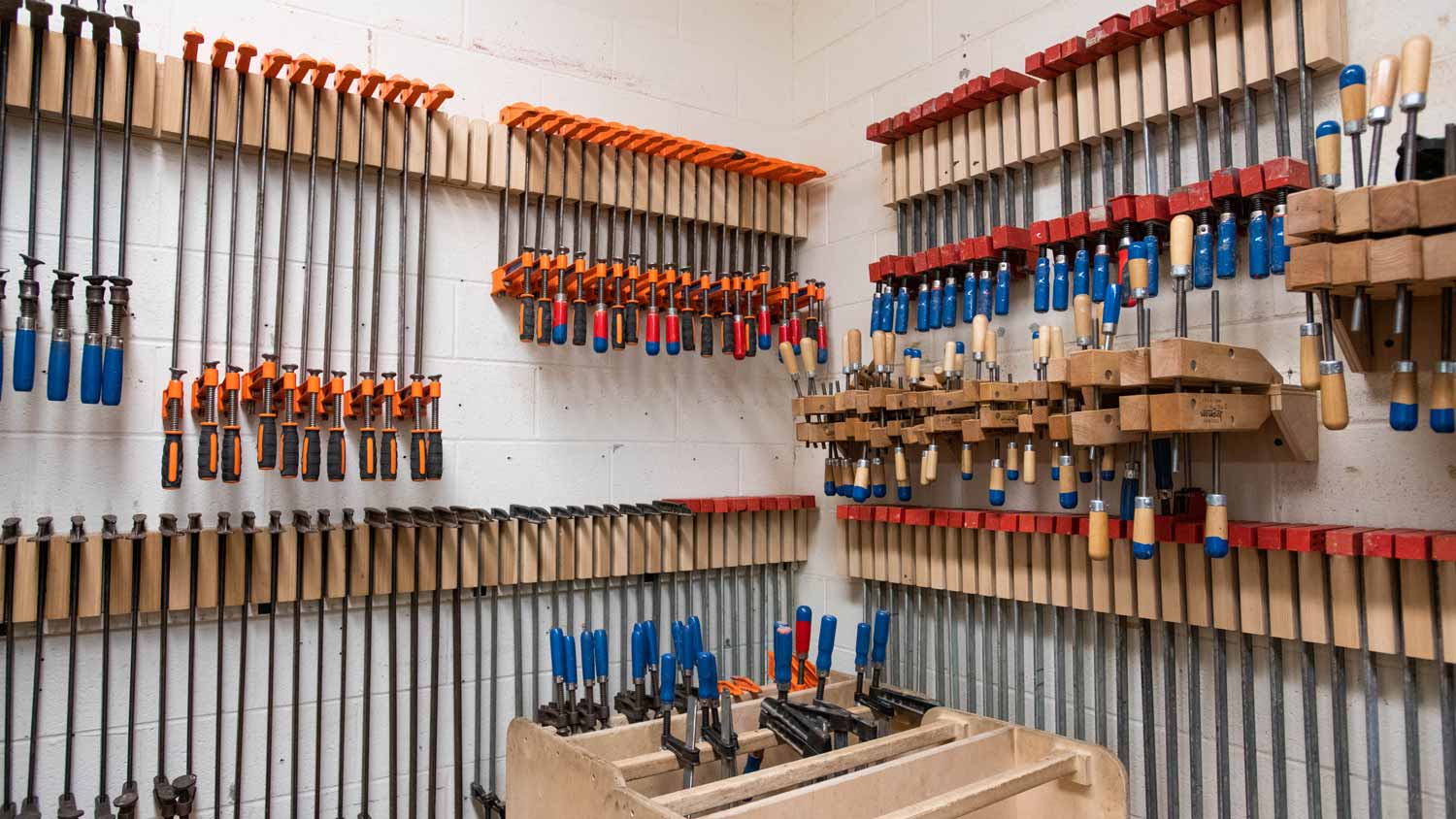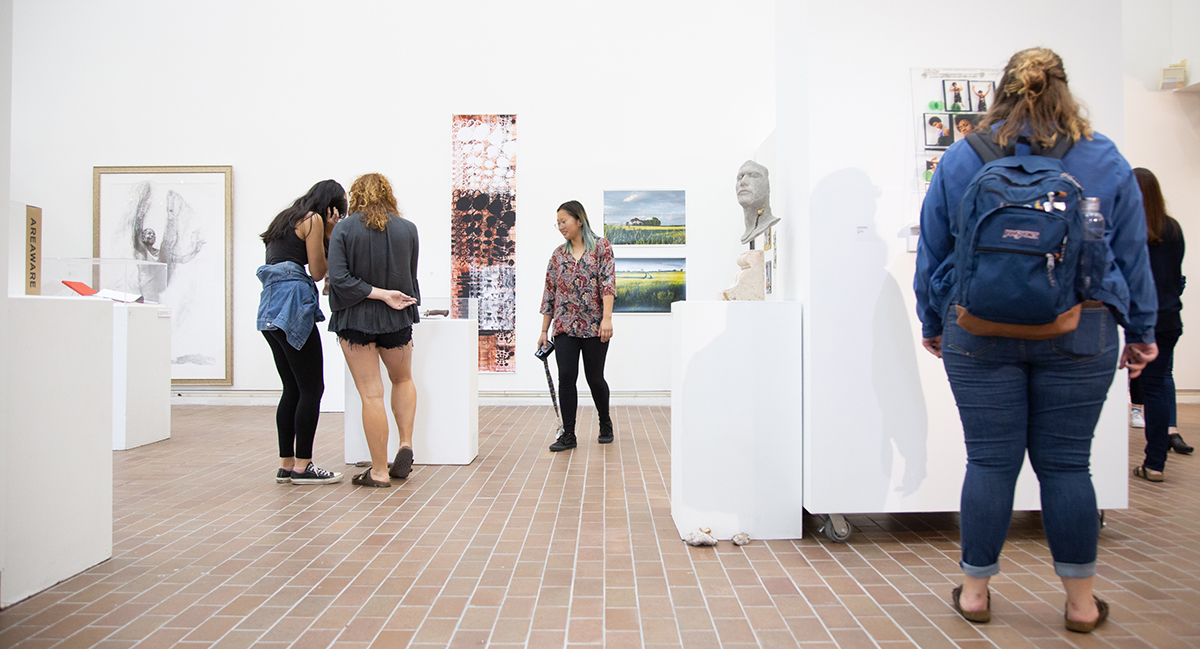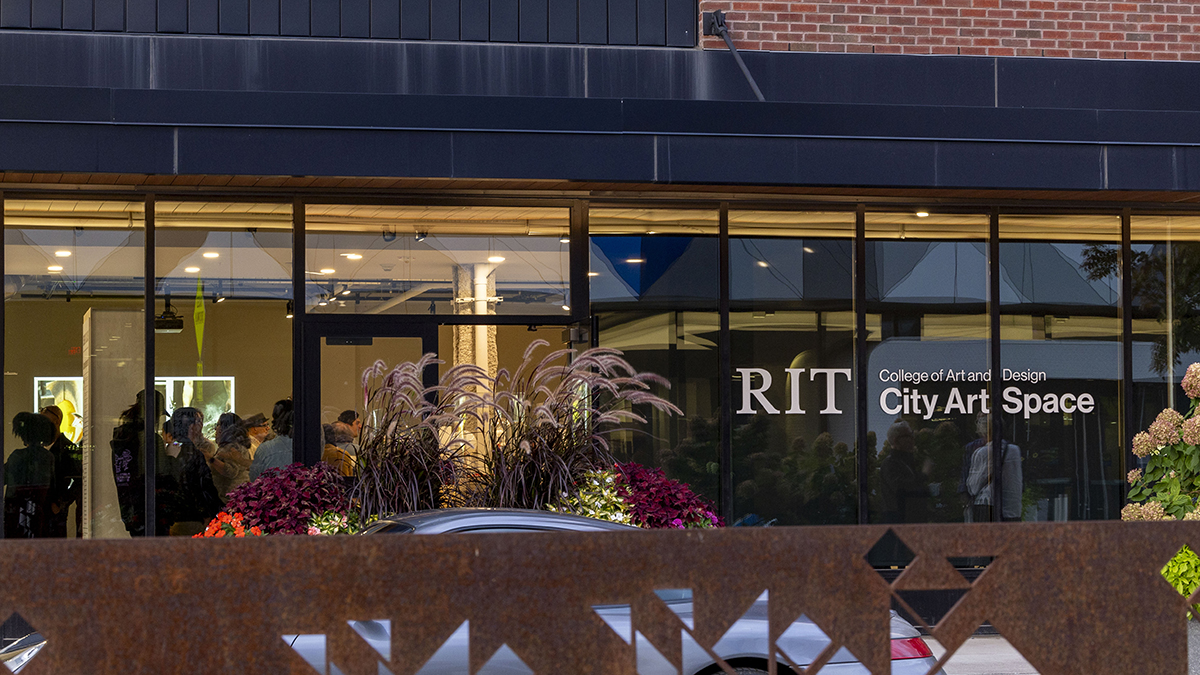Furniture Design Master of Fine Arts Degree
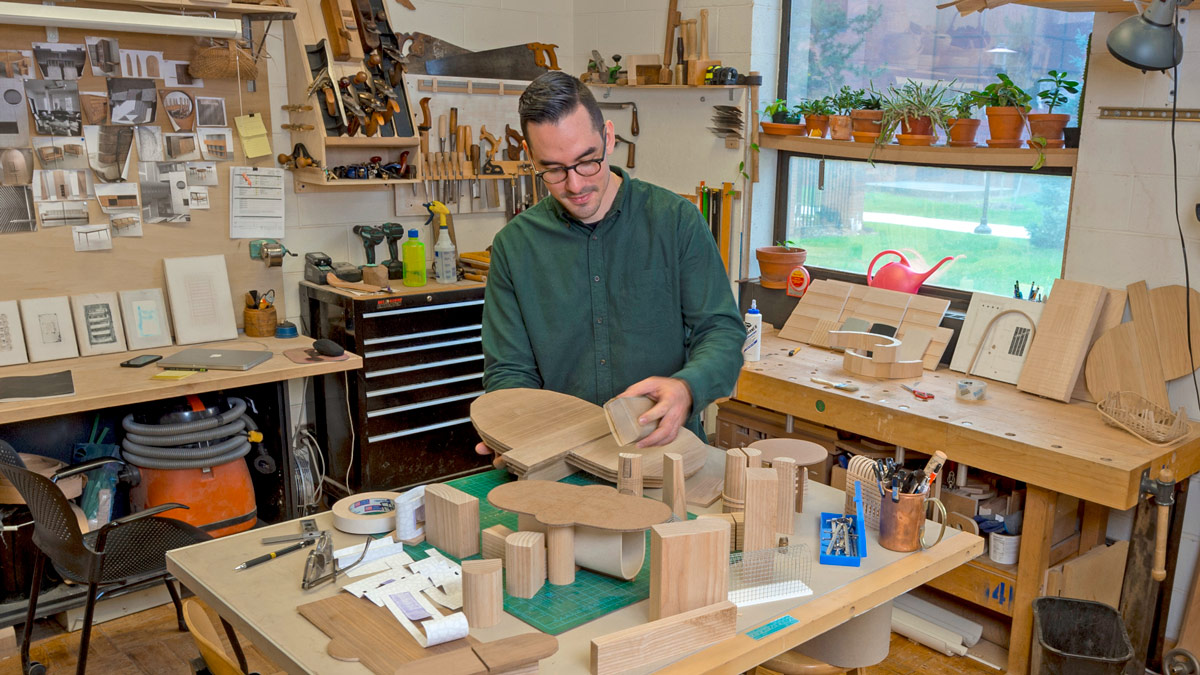
Furniture Design
Master of Fine Arts Degree
- RIT /
- College of Art and Design /
- Academics /
- Furniture Design MFA
Overview for Furniture Design MFA
The master’s in furniture design is structured to support your individual interests and aesthetic development. While engaging in the design and construction of a range of furniture objects, you will be challenged to advance your aesthetic, conceptual, and design sensibilities while simultaneously strengthening your building techniques and construction strategies. You will be exposed to a broad range of contemporary practices and creative approaches to design and art-making in support of experimentation, critical reflection, and the development of your personal aesthetic and design philosophy.
RIT’s Master’s in Furniture Design
The first year of the furniture design degree exposes you to a broad range of critical issues related to the conception and production of art, serves to inspire and provoke your critical reflection, and facilitates the development of your preliminary thesis topic. You will spend ample time creating work, while you strengthen your woodworking techniques, design fundamentals, and your sense of personal creative expression. In the second year, you will continue to refine your work aesthetic as you propose and fully engage in a thesis project. You will work with RIT's gallery coordinators and curators to install and exhibit a final body of work.
Furniture Design Scholarship Available
The Beth and Ira Nash Endowed Scholarship is available to qualified applicants applying to the master's in furniture design. Learn more about the Beth and Ira Nash Endowed Scholarship, including application deadlines and how to apply.
Studio Residency Program
The School for American Crafts offers a Studio Residency Program for students in ceramics, furniture design, glass, and metals and jewelry design. Residence positions are limited and are awarded after the review of all applicants’ portfolios, transcripts, and references. An interview is required. Accepted residents are required to register for one independent study credit during each semester of residence.
Accepted residents are expected to be present in their assigned studio during class hours and to contribute up to 10 hours of work per week in the main studio. These work hours are coordinated and overseen by the faculty in the resident's discipline. In exchange, the school will provide workspace, access to facilities, and supportive instruction. The resident is invited to participate in the full range of studio activities.
Participants may be those seeking additional studio experience prior to undergraduate or graduate study, early career professionals, or teachers on leave who wish to work again in an academic studio environment. The faculty in each discipline will make decisions concerning appropriate candidates.
Inquiries should be made to the Studio Residency Program, School for American Crafts, College of Art and Design, Rochester Institute of Technology, 73 Lomb Memorial Drive, Rochester, NY 14623-5603.
-
Affordable Now. Valuable for Life.
Earn your master’s degree without the full price tag. With Master Up you can receive a 30% tuition scholarship for an RIT master’s degree.
-
Discover how graduate study at RIT can help further your career objectives.
On-Campus Open House | November 20
Virtual Admissions Webinars | Recordings Available
Virtual Academic Sessions | Recordings Available
Careers and Experiential Learning
Typical Job Titles
| Craft Artist | Sculptor | Furniture Designer |
| Designer |
Cooperative Education and Internships
What makes an RIT education exceptional? It’s the ability to complete relevant, hands-on career experience. At the graduate level, and paired with an advanced degree, cooperative education and internships give you the unparalleled credentials that truly set you apart. Learn more about graduate co-op and how it provides you with the career experience employers look for in their next top hires.
Co-ops and internships take your knowledge and turn it into know-how. Your art and design co-ops provide hands-on experience that enables you to apply your artistic capabilities in dynamic professional settings while you make valuable connections between classwork and real-world applications.
Cooperative education, internships, and other experiential learning opportunities are optional but strongly encouraged for graduate students in the MFA in furniture design.
Creative Industry Days
Connect with Design Industry Leaders
RIT’s Office of Career Services and Cooperative Education hosts Creative Industry Days, which connects students majoring in art, design, film and animation, photography, and select computing majors with companies, organizations, creative agencies, design firms, and more. Creative Industry Days are a series of events that allow you to network with company representatives and interview directly for open co-op and full-time employment positions.
Featured Work and Profiles
-
Embracing creativity and exploration
Alex Lobos, Gregory Halpern, Elizabeth Kronfield, Todd Jokl The College of Art and Design at RIT offers distinctive graduate degrees that combine the best of art, design, creativity and technology. Our diverse portfolio of graduate program offerings includes...
Read More about Embracing creativity and exploration -
Culture in Art - Arabic inspiration
Fatmah Bamashmous ’18 MFA (Furniture Design), from Saudi Arabia, combines Arabic inspiration with traditional woodworking techniques, infusing her cultural heritage with contemporary functional...
Read More about Culture in Art - Arabic inspiration -
Slip Cast Experiments
Ryan Zimmerman This piece — "Vessel Study: Interior Friend" by Furniture Design MFA student Ryan Zimmerman — is one of a series of similar experimentations, in which he explored the organization and...
Read More about Slip Cast Experiments -
Alumna Helps Lead Prison Outreach Program
Leah K. Woods ’00 MFA (Woodworking and Furniture Design) chose to attend RIT because of the Furniture Design MFA program’s focus on artistic approach and craftsmanship. Those values have shaped her...
Read More about Alumna Helps Lead Prison Outreach Program -
Culture in Art - Chinese culture and Asian philosophy
Yahui Gao Yahui Gao ’20 MFA (Furniture Design) designs and creates work that contributes to the transformation of an environment, bringing us closer to a feeling of home. The circle becomes a primal connection...
Read More about Culture in Art - Chinese culture and Asian philosophy -
Pioneering Female Artist
As one of the first women to break into the field of studio furniture, trailblazing female artist Wendy Maruyama ’80 MFA (Furniture Design) combines education and ethics on subjects ranging from...
Read More about Pioneering Female Artist
Curriculum for 2025-2026 for Furniture Design MFA
Current Students: See Curriculum Requirements
Furniture Design MFA
The curriculum below outlines the typical course sequence(s) for this program.
| First Year | ||
|---|---|---|
| Fall | Hours | |
| CWFD-601 | Furniture Design Graduate Studio 1 | 6 |
| STAR-701 | Technology in the Studio | 3 |
| STAR-714 | Ideation and Series | 3 |
| Open Elective | 3 | |
| Hours | 15 | |
| Spring | ||
| CWFD-601 | Furniture Design Graduate Studio 1 | 6 |
| STAR-702 | Studio Art Research | 3 |
| Professional Elective 2 | 3 | |
| Open Elective | 3 | |
| Hours | 15 | |
| Second Year | ||
| Fall | ||
| CWFD-601 | Furniture Design Graduate Studio 1 | 6 |
| STAR-706 | Business Practices for Studio Artists | 3 |
| STAR-790 | Research and Thesis | 3 |
| Open Elective | 3 | |
| Hours | 15 | |
| Spring | ||
| CWFD-601 | Furniture Design Graduate Studio 1 | 6 |
| STAR-718 | Research Methods and Publication | 3 |
| STAR-890 | Thesis | 6 |
| Hours | 15 | |
| Total Hours | 60 | |
- 1
The graduate studio course (CWFD-601 Furniture Design Graduate Studio) is a repetitive, 24-credit hour requirement. Course content is not sequential but continually builds on previous experiences. By retaking this course four times, students develop their creative and technical skills in the particular focus.
- 2
Students must select one (1) Professional Elective from the list below.
Professional Electives
Admissions and Financial Aid
This program is available on-campus only.
| Offered | Admit Term(s) | Application Deadline | STEM Designated |
|---|---|---|---|
| Full‑time | Fall | February 1 priority deadline, rolling thereafter | No |
Full-time study is 9+ semester credit hours. International students requiring a visa to study at the RIT Rochester campus must study full‑time.
Application Details
To be considered for admission to the Furniture Design MFA program, candidates must fulfill the following requirements:
- Complete an online graduate application.
- Submit copies of official transcript(s) (in English) of all previously completed undergraduate and graduate course work, including any transfer credit earned.
- Hold a baccalaureate degree (or US equivalent) from an accredited university or college. A minimum cumulative GPA of 3.0 (or equivalent) is recommended.
- Submit a current resume or curriculum vitae.
- Submit a personal statement of educational objectives.
- Submit two letters of recommendation.
- Entrance exam requirements: None
- Submit a portfolio. View portfolio requirements.
- Submit English language test scores (TOEFL, IELTS, PTE Academic, etc.), if required. Details are below.
English Language Test Scores
International applicants whose native language is not English must submit one of the following official English language test scores. Some international applicants may be considered for an English test requirement waiver.
Duolingo (DET): 120
IELTS: 6.5
LanguageCert Academic: 70
PTE Academic: 56
TOEFL: 79
International students below the minimum requirement may be considered for conditional admission. Deaf and hard-of-hearing test takers with significant hearing loss do not need to take the listening and speaking sections for the TOEFL and IELTS. Each program requires balanced sub-scores when determining an applicant’s need for additional English language courses.
How to Apply Start or Manage Your Application
Cost and Financial Aid
An RIT graduate degree is an investment with lifelong returns. Graduate tuition varies by degree, the number of credits taken per semester, and delivery method. View the general cost of attendance or estimate the cost of your graduate degree.
A combination of sources can help fund your graduate degree. Learn how to fund your degree
Crafts Scholarships
Students applying to the MFA programs in ceramics, glass, furniture design, and metals and jewelry design may apply for a competitive, full-tuition scholarship. Learn more about the crafts scholarships, including eligibility, application requirements, and deadlines to apply.
Related News
-
September 24, 2025

New School of Film and Animation director, faculty roles for 2025-26
Ricky Figueora taking over as the new director of RIT's School of Film and Animation headlines exciting promotions and additions to the College of Art and Design faculty.
-
August 7, 2025

A month of making sets stage for faculty's solo exhibition
A New Year's Resolution turned into a staunch commitment to research for Associate Professor David Schnuckel, whose solo exhibition "redundancies" is on view at the Museum of American Glass through Dec. 28.
-
September 19, 2024

‘My, My, Tiger’s Eye’ exhibition brings graduate student artwork to the Rochester community
Focusing on their growth as artists is what motivated Alex Paat and 14 graduate students to create My, My, Tiger’s Eye, a new exhibition hosted at Flower City Arts Center.
Contact
- Bethany Iraci-McBane
- Assistant Director, Graduate Admissions
- Office of Graduate Admissions
- Enrollment Management
- 585‑475‑5235
- bimges@rit.edu
- Andy Buck
- Professor
- School for American Crafts
- College of Art and Design
- aabsac@rit.edu
School for American Crafts



